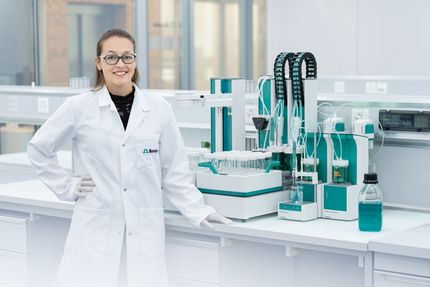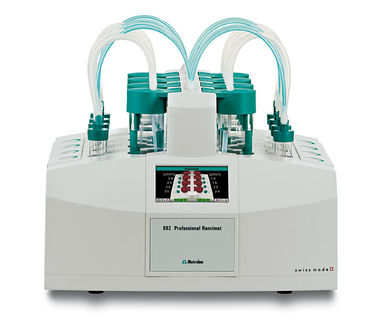To use all functions of this page, please activate cookies in your browser.
my.chemeurope.com
With an accout for my.chemeurope.com you can always see everything at a glance – and you can configure your own website and individual newsletter.
- My watch list
- My saved searches
- My saved topics
- My newsletter
Acrydite
Acrydite is a phosphoramidite that allows the synthesis of oligonucleotides with a methacryl group at the 5' end (less commonly 3' or internal). Acryl oligonucleotides have been tested, but the acryl group is not stable to storage. Acrydite modified oligonucletides can react with nucleophiles such as thiols (Michael addition chemistry), this forms the basis of the ez-rays chemistry which was used for microarrays. More importantly, Acrydite modified oligonucleotides can be incorporated, stochiometrically, into hydrogels such as polyacrylamide, using standard free radical polymerization chemistry, where the double bond in the Acrydite group reacts with other activated double bond containing compounds such as acrylamide. Product highlight
Chemical StructureThe chemical structures shown in the box are somewhat misleading as they show a molecule that does not actually exist. It is recommended that literature be consulted for more details. HistoryThe idea of acrylamide modified DNA was developed by T. Christian Boles, while working at Mosaic Technologies, a now-defunct biotechnology company located in Waltham, MA. The IP was licensed, along with a microarray technology ("ez-rays") to Matrix Technologies, of Hudson, NH, which is now part of Thermo Electron Corp. Acrydite is commercially available from Biosearch Technologys, Novato, CA. Acrydite-modified oligonucleotides can be obtained from vendors such as IDT. HybridgelThe first use of Acrydite was in a technology called hybridgel[1]. In Hybridgel, Acrydite-modified oligos are incorporated into a standard polyacrylamide gel system; as complementary ss nucleic acid moves past the immobilized Acrydite oligos, the complementary DNA is captured. Hybridgel-like technology is widely used as a DNA purification system, as in a DNA sequencing technology developed at Berkeley[2]. Acrydite technology can also be used to purify DNA, as in the Pre-gen colon cancer test[3] developed by Exact Sciences. PolonysMitra and Church at Harvard Medical School[4] developed a novel DNA sequencing technology based on Acrydite modified probes; this technology is used by Agencourt. Acrydite and PCRSurprisingly, the Acrydite group survives PCR, so Acrydite-modified PCR products can be prepared and used as oligos. However, as is common with polymers that are longer than the persistence length, the coupling of Acrydite-modified PCR products is inefficient, as the ends of the molecules are not accessible. Acrydite and ProteinAcrydite-modified oligonucleotides have been used to study protein DNA interactions[5] Acrydite and DNA ComputingRecent experiments by Braich et al. solving the Satisfiability Problem have demonstrated that Acrydite can be used in DNA computing to implement the extraction operation. Previously, a biotin-avidin magnetic bead system was used for this purpose. Exact Scientific Colon Cancer TestAcrydite technology has been evaluated by Exact Scientific for use in its colon cancer test. Citations
References
Categories: Amides | Organophosphates |
|||||||||||||||||||||||||
| This article is licensed under the GNU Free Documentation License. It uses material from the Wikipedia article "Acrydite". A list of authors is available in Wikipedia. | |||||||||||||||||||||||||







